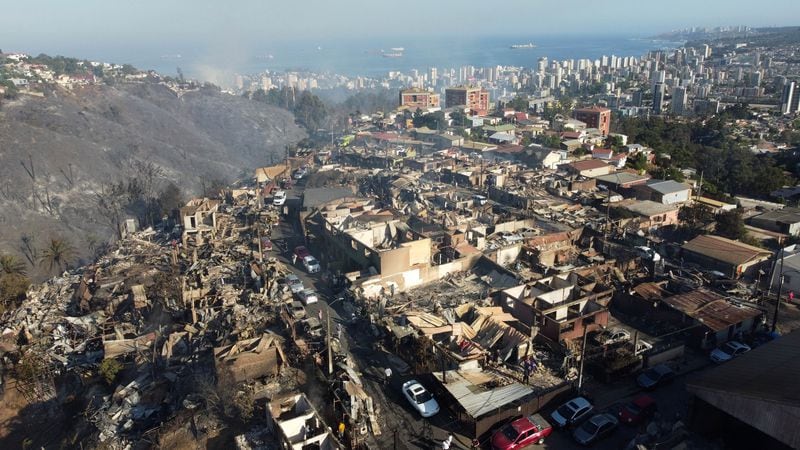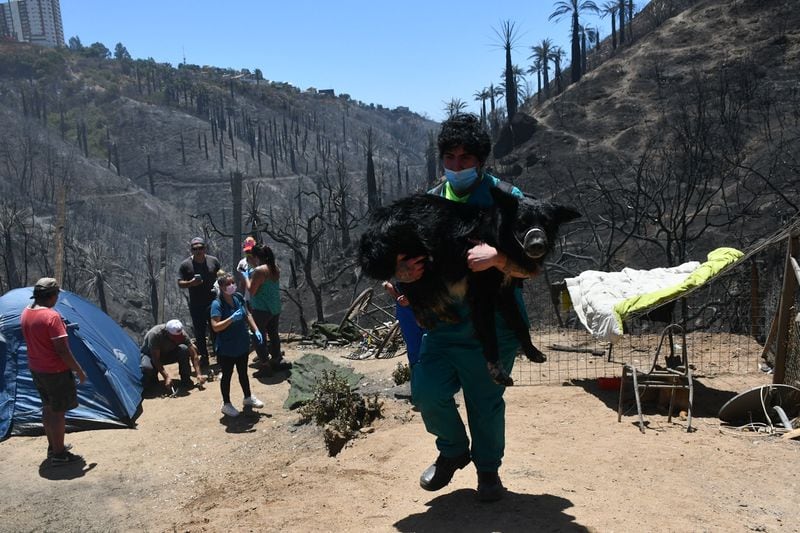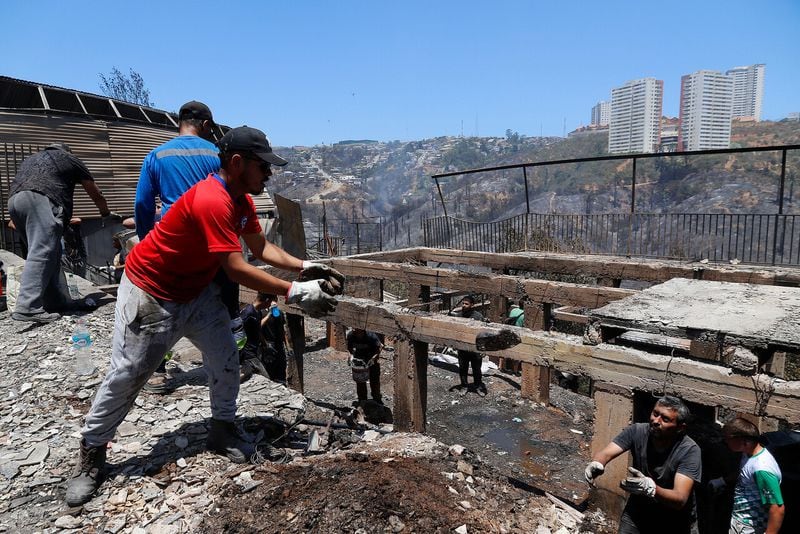Working for free has two-way rewards: the person who helps benefits as much as the person who receives it. Experts explain how solidarity can be positive for physical and mental health, and even help professionally.
It is not the first time — and it will surely not be the last — that the Region of Valparaíso has seen its summer season marked by a burning tragedy. Last December 22, the tongues of flame visible from various points in the city, together with the orange and purple sky, the heavy and hot air, as well as the smell of smoke and the sirens of emergency vehicles, reminded the memory of the Viñamarinos and porteños the mega fire of 2014, which destroyed more than 2,000 houses on the heights of the port, leaving 11,000 homeless and costing the lives of 15 people.
In number, the consequences of the recent fire which broke out in the neighborhoods of Forestal and Nueva Aurora, in the heights of Viña del Mar, are fortunately minor: nearly 400 homes were destroyed, a little more than a thousand homeless and two dead. The drama, however, is the same: urgent needs and scarce resources.
To the municipal and governmental deployment was added the work, according to the figures of the municipality, of about a thousand volunteers, who still cooperate in the work of clearing and reconstruction, organization in the centers of collection and distribution of supplies, including taking care of injured people and animals.

In these contingencies, it is demonstrated, once again, that the state and official organizations are not as large and equipped as one might imagine, making the incorporation of people and voluntary resources essential to react to the emergency.
But what drives a person to invest their time and skills for free to help others? Is it simply selfless altruism or does solidarity have personal benefits?
a two-way street
In 2012, the University of Exeter published a study entitled Volunteer, it could be good for you! He concluded that helping or working without material reward improves mental health and may even prolong life.
“People who volunteer reported lower levels of depression, higher life satisfaction, and generally higher levels of well-being,” the abstract states.
The first logical thing that comes to mind when you think of volunteering is that it’s about helping others. And that’s it. But Denisse Medina, clinical psychologist at Medismart explains that it is also “a practice whose benefits are obtained in a two-way way, both for the person who receives the help and for the one who provides it”.
To fully understand this analogy, Medina suggests delving into the biology and psychology of human beings:
“The thoughts, feelings and emotions we have determine the types of chemicals and hormones our body will produce. This then translates into how we feel, how we cope with everyday life and how good our health will be. “, he says.

“There are altruistic emotions, of feeling good to make others feel good, that generate great chemical and hormonal benefits. These send the signal to the body to secrete dopamine, endorphin, serotonin and oxytocin, a cocktail of hormones that induce a feeling of well-being and tranquility”.
So much for the chemical side. But as with anthropological ones, Medina says humans are an inherently social species, so generating positive connections with others contributes directly to happiness, health, and longevity.
“When we develop kindness and help others, a sense of belonging to a group is generated, which allows us to develop social skills and support networks, in addition to reducing depressive symptoms and stress.”
It is therefore not a coincidence or a subjective feeling that the person who performs voluntary activities feels in a better mood and may even reflect a better countenance: the high dose of hormones and positive chemicals strengthen the immune and nervous system . A mixture that reduces anxiety and even lowers cholesterol levels.
Participating, even if it is small, in the solution of an emergency, provides satisfying sensations, even if it also has an associated cost. Especially if you give yourself to it physically.
The body, after certain days of unloading trucks, removing rubble, packing boxes or doing construction work — and especially at a certain age — begins to suffer, especially in the lower back, hands and wrists. Mentally, it is also a challenge to come into direct contact with a difficult and dramatic reality, which one often prefers to avoid, without feeling resentment or even feeling that everything that happens in life is insignificant. .
anger is a gift
Héctor Guarda, chaplain of ROOF-Chile – an organization that coordinated much of the assistance to those affected by the fire – recognizes that many of the people who volunteer are those with certain privileges, such as time or resources, and not necessarily good intentions.
But the goal, he explains, “is that these privileges and gifts are put at the service of the common good and the reality of the most excluded families”.
Although this may be correct in the case of TECHO, especially since they are very young people, behind the thousand people who are or have been volunteers in the Viña del Mar emergency, there are approximately 25 organizations involved, in addition to individuals They do it independently. You can see activists of all kinds, such as people who dive in mountains of donated clothes to be divided between what is useful and what is not, the self-employed, students, retirees, housewives, street vendors and even the homeless.
“The main source of motivation is pain and anger,” says Catalina González, community organizing and volunteering manager at TECHO-Chile. Volunteerism arises from the need to show empathy and to understand “that it is worth mobilizing to work with other people with the same conviction that things can be different”.

This energy is so powerful, González says, that after you start helping and volunteering, this space begins to gain ground in life and the calendar. “It happens to a lot of people that once they start volunteering, they prefer to spend most of their time on that and not on other things, which don’t seem so important any more in comparison.”
For Guarda, the development of this momentum and social commitment should ideally start in youth. For this reason, at TECHO, volunteers start from the last years of school, “because this is how the spirit of commitment to the country is generated”.
González sees it a little differently: “It’s important that people can do this from their youth, but also at any time: it helps to keep an open mind and to do something relevant, instead of having a myopic view of current reality”.
skill development
Beyond anger at injustice or pain at misfortune – and the eventual well-being it produces – the act of acting on it can have other factors. According to psychologist Denise Medina, gaining a sense of territorial and community roots is as important as the above.
“Plus, you can make new friends and feel more included in a community,” he says. “Skills related to teamwork, problem solving and task management are developed. But you also explore your interests and passions, even finding meaning in your life.
“Although we live in a rapidly changing and demanding society, which sometimes prevents us from having extra time to devote to other activities, volunteering allows you to obtain benefits at the same time as you help others . In addition, you develop skills and feelings that last over time,” he concludes.
In fact, Catalina González has seen how people develop certain social skills through volunteering, such as leadership, strategic vision and foresight, which can be very beneficial at work and professionally. “Ultimately, being always overloaded, in a good way, using your abilities to the fullest, forces you to set bigger goals in life.”
Source: Latercera
I’m Rose Brown , a journalist and writer with over 10 years of experience in the news industry. I specialize in covering tennis-related news for Athletistic, a leading sports media website. My writing is highly regarded for its quick turnaround and accuracy, as well as my ability to tell compelling stories about the sport.


